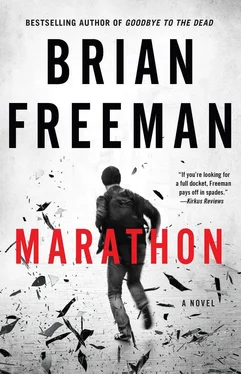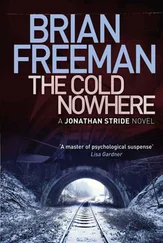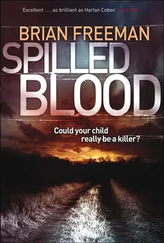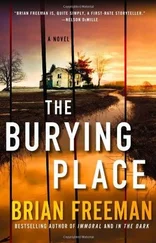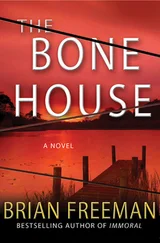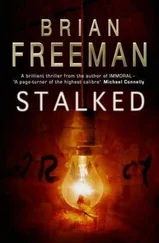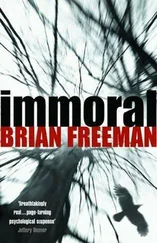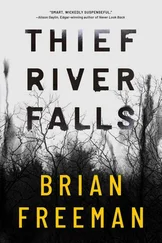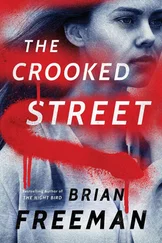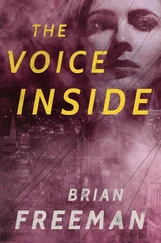His breathing had become heavier, as if he were dragging air into his lungs. His vision was blurry. Even so, he drove faster, reaching eighty miles an hour, as if he could run from the police and run from death at the same time.
“You don’t have much time left, Wade.”
He glanced over at the passenger seat and saw a ghost. Travis sat there. Travis, who was already dead under the Third Avenue building, with a bullet hole in his skull.
“Go away,” Wade murmured. The blood loss was playing tricks on his mind. “Go away. You’re not real.”
He looked again, and Travis was gone. The seat was empty.
He swooped past the FBI helicopter hovering above the highway, but it rose up and kept pace with him effortlessly. There was nowhere to go. He looked in the rearview mirror, and he could see the lights of police cars behind him. As fast as he went, they went faster. They were closing in on him. In less than a minute, they’d roar around the Cadillac and run him off the road.
They could probably save him if they caught him now. Tie off the leg. Put him in an ambulance. And for what? So they could put him on trial and convict him and send him to rot in a hole for the rest of his life? So some gangbanger could pay off a guard and shove a knife into his gut during the one hour per day the prisoners were allowed outside?
That was no life. That was torture.
He went ninety miles an hour, but the police still kept getting closer.
“You know I never loved you, right?”
Wade looked at the passenger seat, and there was Joni. Another ghost. Joni, in a tank top and shorts, with the amazing body and the tattoos and the piercings and the supersized breasts that no one but him was supposed to touch. Joni, who’d been humiliating him ever since they got married.
“I hung around for the money,” Joni said. “I mean, you figured that out, huh?”
“Yeah,” Wade said. “I figured that out.”
Then she was gone, too. He was alone.
“ Pull over and stop ,” the FBI said again.
He looked northward on the highway. Coming toward him on the opposite side of the road was a semitruck, one of the big rigs, thundering toward the city. It was going fast, and so was Wade. They’d pass each other in seconds. He would feel the vibration in its wake, nearly blowing him off the road.
Wade tapped his brakes.
Behind him, the police slowed, too. They saw his brakes and figured he was pulling off the highway. Instead, Wade undid his seat belt. The truck stormed closer, loud enough that its thunder reached him. He had to time it just right. He had to be in the other lane at the perfect moment. He didn’t want the truck to brake; he wanted the impact at full speed. He’d fire as fast as a bullet, as fast as a rocket, and be gone.
Travis was back in the passenger seat next to him. The kid sang a chorus of “Rocket Man” and began to laugh. Wade laughed, too. Rocket man — that was funny. The two of them laughed and laughed.
The helicopter was right there ahead of him, like a crow in the sky. The police were right behind him. They thought they had him. They thought he had nowhere to go. The truck barreled down the opposite lane, and the driver was probably wondering what the hell was going on.
They were so close. They were about to pass, car and truck.
Right.
Now.
Wade flicked the wheel of the Cadillac and lurched into the other lane. The truck was on top of him, horn blaring.
Travis stopped laughing.
Khan answered the door at his Woodland home. He had a wedding picture of himself and Ahdia in his hand as he did.
He hadn’t done much else in recent days, other than look at family pictures and talk to his lawyers about a plea deal that would keep him free despite his pointing a gun into the face of Dawn Basch. Around him, the house was still a mess from the search the FBI had made. He hadn’t had the energy to clean up. He’d slept on the sofa, rather than going into their bedroom. Eventually, he would have to decide about Duluth and this house. Stay or go. But Haq had told him not to rush anything, and Haq was right.
He opened the door, but he didn’t recognize the man on the porch. He appeared to be in his forties, with a muscular build and shaved head. At first, Khan assumed the man was a reporter, but he wore a suit and tie, which ruled out most of the journalists he’d met lately. Beyond him, on the street near the woods, Khan saw a pretty blond woman waiting in the man’s car. There was a little boy in the backseat.
“Mr. Rashid?” the man said.
“Yes.”
“My name is Michael Malville.”
Khan shook his head in confusion. “I’m sorry, I don’t know who you are. Are you a reporter? Or a lawyer? Because I already have plenty of both.”
“No.”
Oddly, the man on the porch began to cry. It was strange, seeing a strong man break down so completely in front of him. He realized that the man was staring at the photograph that Khan carried in his hand.
Malville wiped his face and tried to form words. “I’m — I’m the man who destroyed your life.”
“What?” Khan asked.
“I made a mistake. I thought — I was sure — that you bumped into me on Superior Street during the marathon. I was tired, I was angry, and I was just wrong. And I–I told the world about it. And now you’ve lost your wife and son, and you’ve been through so much pain, and it’s all my fault. So I needed to come here, to see you face-to-face. I need to apologize. To tell you I am so, so sorry. If I had ever dreamed—”
Khan held up a hand to stop him. His face clouded over. He tried to find something to say, but he had nothing. No words. He had to brace himself against the doorframe to stop himself from falling.
“It was you?” Khan said finally.
“Yes.”
He thought about the night in the Woodland grocery store, the night when it had all begun. Someone had thrust a phone in his face. Is this you? Because it sure looks like you. One photograph had turned his life upside down. One photograph had destroyed his family. One photograph, sent around the world by the man standing in front of him.
“You can do whatever you want,” Malville went on. “Scream at me. Hit me. Sue me.”
“I want nothing from you, Mr. Malville,” Khan told him brusquely.
He closed the door; he didn’t slam it. Malville waited on the porch, but then, a few seconds later, he walked away with his head down. Khan turned around and leaned against the glass, and soon he was crying, too. Crying for everything that was lost. Crying for his empty house. He wished he could blame Michael Malville. He wanted to feel hatred for this man, but he realized he didn’t. He couldn’t. Hatred was what had killed Ahdia and Pak. Hatred didn’t solve anything. He had already made a vow to himself never to hate again.
Khan opened the door quickly. “Wait,” he called.
Malville was halfway down the walk. He stopped as he heard Khan’s voice. Khan joined him in the warm summer afternoon and saw the man’s face twisted in tears and pain, like his own.
“Why did you come here, Mr. Malville?” Khan asked.
“To tell you I’m sorry.”
“Do you want me to forgive you? Is that what you expect?”
Malville struggled with his words. “I don’t expect anything. Believe me, I’m not asking for anything from you. I just felt I needed to tell you in person that I was the one who wronged you and that I’m sorry.”
Khan took a long, deep breath. He gestured at the car in the street. “Is that your wife?”
“Yes. Alison.”
“And your son?”
“Evan.”
“How old is he?”
“Twelve,” Malville said.
“A handful?”
Читать дальше
